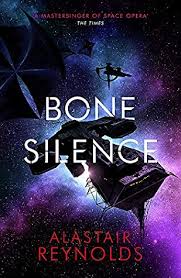The first book was Revenger.
The second book was Shadow Captain.

This is the third book.
I really like Alastair Reynolds’ work. I own all of his novels (except the Dr Who), and most of his chapbooks and collections. I have re-read several of them, and I get excited about new books.
But.
Um. I was bored by this book.
Like, I skimmed through paragraphs of description in the last third or so.
When I got to the end, I just felt a bit… numb. How had it come to this? How could I possibly not have loved this book?
Let me suggest some reasons:
- The book is too long. Maybe 1/3 too long. There are long, boring descriptions that add nothing to the sense of place or experience. There’s lots of time where nothing happens – and sometimes that can be fine; I will read Legolas and Aragon and Gimli running across Rohan endlessly – but these periods of waiting were… boring.
- The climax didn’t feel like it fit the book itself, or the trilogy overall. Actually I started feeling like this in the second book where all of a sudden we weren’t just off to save someone, but there was something weird going on with the whole civilisation – but that wasn’t something that was even foreshadowed earlier so it came as quite a surprise. And then this book is theoretically all about finding out the answers to those civilisation-wide issues, but there’s a whole lot of waaaaaiting… and then BAM here are (most of) the answers you were waiting for. Which were themselves a bit weird and didn’t feel like they fit the world-building to that point.
- Fura and Adrana, the sisters at the heart of the story: I didn’t really care. Maybe if I had re-read the first two books before getting into this one, I would have been more concerned with their welfare and fates. As it was, neither of them were particularly appealing as characters, and I didn’t feel very compelled to cheer for them.
- The writing style. It was already a bit grating in the first book, and it really wasn’t working for me by this stage. The trilogy is basically like Hornblower in space; the space ships use (light)sails to get around, and there are pirates and privateers and loot and boarding parties and such. The language reflects that idea of 18th-century nautical-ness, especially in conversation. And it got old.
So there we go. I haven’t always adored every Reynolds; the Poseidon’s Children books weren’t my favourite, but I still enjoyed them. Hopefully this book is a blip – maybe a case of the editor not editing as thoroughly as previously? Who knows. I will still be buying the new Reynolds, whenever that comes out; I’ll just be a bit more cautious in my enthusiasm, I suspect.